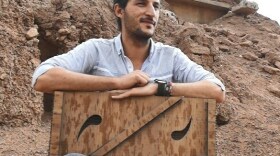President Obama arrived in Tanzania on Monday, and that's the closest he'll get to his father's homeland on his African tour, a decision that has upset many Kenyans.
"Obama's snub has left me with a foul taste in the mouth. It verges on snobbishness; not after the overwhelming goodwill he received from Kenyans of all walks of life in his emphatic quest for presidency in 2008," Antoney Luvinzu wrote in a letter to the editor published in the Daily Nation, Kenya's largest newspaper.
As outraged Kenyan editorial writers and bloggers have pointed out, Obama will "fly right past" Kenya — the birthplace of his father — as he comes and goes from Tanzania, the final leg of a trip that also included stops in South Africa and Senegal.
This is particularly galling to Kenyans who have noted that on a European trip in May 2011, Obama made time to celebrate his distant Irish roots by visiting the sleepy village of Moneygall, the birthplace of Obama's great-great-great grandfather.
So why won't he share some cornmeal, known as ugali, with the Kenyans after knocking back a Guinness with the Irish?
The Obama administration's answer is blunt: The new Kenyan president, Uhuru Kenyatta, and his deputy, William Ruto, who were both elected this March in a vote that fell sharply along tribal lines, stand accused of crimes against humanity by the International Criminal Court.
They are charged with paying gangs of young men to commit mayhem – including rape, murder and mass looting — during the tribal violence that followed a disputed presidential election in 2007.
Ruto is scheduled to stand trial at The Hague in September, with Kenyatta up next in November. Both men deny the charges against them. They have indicated they plan to attend parts of the trial, but not the full proceedings.
"It just wasn't the best time for [Obama] to visit Kenya at this point," a White House official said on condition of anonymity. "Given the fact that Kenya is in the aftermath of their election and the new government has come into place and is going to be reviewing these issues with the ICC and the international community."
Many Kenyans Upset
That rationale has failed to mollify Kenyans, and not just among Kenyatta supporters. Many Kenyans who voted for other candidates in the recent election are nevertheless offended. Obama, after all, still has a number of relatives in the country.
One reason may be that the International Criminal Court fails to register the same moral authority in Africa that it is accorded in the West. There is a widespread feeling across the continent that the ICC is racist — nearly all of its investigations involve Africans — as well as incompetent, having managed only one conviction in a decade.
During the campaign, Kenyatta and Ruto managed to turn the charges against them into a tactical advantage. They portrayed the ICC as an unwelcome agent of Western interference in African affairs, and an insult to any self-respecting Kenyan voter.
Kenyatta's victory speech made a point of describing how Kenya was less reliant than it used to be on Western aid and Western favor. With its growing middle class, strong economy and newly discovered deposits of oil and gas, Kenya has eager suitors in China, India and the Middle East.
"We expect the international community [to] respect the sovereignty and democratic will of the people of Kenya," Kenyatta said after the election. "The Africa star is shining brightly, and the destiny of Africa is now in our hands."
Months before Obama sat down to plan his Africa itinerary, Western countries were struggling with how to keep Kenya's tainted regime at a distance while awaiting the ICC's verdict.
Kenyatta may want to show he's not sitting by the phone.
As Obama toured Africa, the Kenyan president was on his own overseas trip — to China.
Copyright 2021 NPR. To see more, visit https://www.npr.org.







